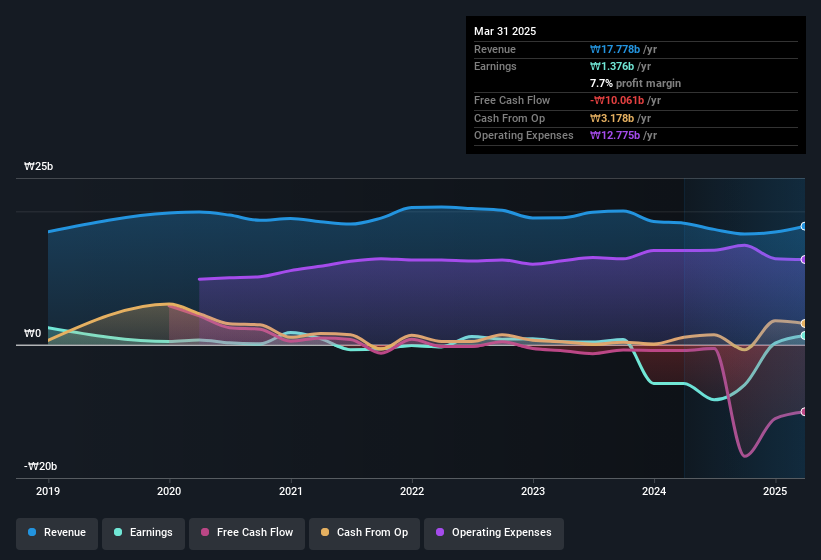The stock price didn't jump after SoftCamp Co., Ltd. (KOSDAQ:258790) posted decent earnings last week. We think that investors might be worried about some concerning underlying factors.
Our free stock report includes 4 warning signs investors should be aware of before investing in SoftCamp. Read for free now.
A Closer Look At SoftCamp's Earnings
In high finance, the key ratio used to measure how well a company converts reported profits into free cash flow (FCF) is the accrual ratio (from cashflow). In plain english, this ratio subtracts FCF from net profit, and divides that number by the company's average operating assets over that period. The ratio shows us how much a company's profit exceeds its FCF.
Therefore, it's actually considered a good thing when a company has a negative accrual ratio, but a bad thing if its accrual ratio is positive. While it's not a problem to have a positive accrual ratio, indicating a certain level of non-cash profits, a high accrual ratio is arguably a bad thing, because it indicates paper profits are not matched by cash flow. That's because some academic studies have suggested that high accruals ratios tend to lead to lower profit or less profit growth.
Over the twelve months to March 2025, SoftCamp recorded an accrual ratio of 0.61. As a general rule, that bodes poorly for future profitability. And indeed, during the period the company didn't produce any free cash flow whatsoever. Even though it reported a profit of ₩1.38b, a look at free cash flow indicates it actually burnt through ₩10b in the last year. We also note that SoftCamp's free cash flow was actually negative last year as well, so we could understand if shareholders were bothered by its outflow of ₩10b. Having said that, there is more to the story. The accrual ratio is reflecting the impact of unusual items on statutory profit, at least in part. One positive for SoftCamp shareholders is that it's accrual ratio was significantly better last year, providing reason to believe that it may return to stronger cash conversion in the future. As a result, some shareholders may be looking for stronger cash conversion in the current year.
See our latest analysis for SoftCamp
Note: we always recommend investors check balance sheet strength. Click here to be taken to our balance sheet analysis of SoftCamp.
The Impact Of Unusual Items On Profit
SoftCamp's profit suffered from unusual items, which reduced profit by ₩390m in the last twelve months. In the case where this was a non-cash charge it would have made it easier to have high cash conversion, so it's surprising that the accrual ratio tells a different story. While deductions due to unusual items are disappointing in the first instance, there is a silver lining. We looked at thousands of listed companies and found that unusual items are very often one-off in nature. And, after all, that's exactly what the accounting terminology implies. If SoftCamp doesn't see those unusual expenses repeat, then all else being equal we'd expect its profit to increase over the coming year.
Our Take On SoftCamp's Profit Performance
In conclusion, SoftCamp's accrual ratio suggests that its statutory earnings are not backed by cash flow, even though unusual items weighed on profit. Having considered these factors, we don't think SoftCamp's statutory profits give an overly harsh view of the business. If you'd like to know more about SoftCamp as a business, it's important to be aware of any risks it's facing. To help with this, we've discovered 4 warning signs (3 are significant!) that you ought to be aware of before buying any shares in SoftCamp.
In this article we've looked at a number of factors that can impair the utility of profit numbers, as a guide to a business. But there is always more to discover if you are capable of focussing your mind on minutiae. For example, many people consider a high return on equity as an indication of favorable business economics, while others like to 'follow the money' and search out stocks that insiders are buying. So you may wish to see this free collection of companies boasting high return on equity, or this list of stocks with high insider ownership.
New: Manage All Your Stock Portfolios in One Place
We've created the ultimate portfolio companion for stock investors, and it's free.
• Connect an unlimited number of Portfolios and see your total in one currency
• Be alerted to new Warning Signs or Risks via email or mobile
• Track the Fair Value of your stocks
Have feedback on this article? Concerned about the content? Get in touch with us directly. Alternatively, email editorial-team (at) simplywallst.com.
This article by Simply Wall St is general in nature. We provide commentary based on historical data and analyst forecasts only using an unbiased methodology and our articles are not intended to be financial advice. It does not constitute a recommendation to buy or sell any stock, and does not take account of your objectives, or your financial situation. We aim to bring you long-term focused analysis driven by fundamental data. Note that our analysis may not factor in the latest price-sensitive company announcements or qualitative material. Simply Wall St has no position in any stocks mentioned.
About KOSDAQ:A258790
SoftCamp
Provides cyber security solutions in South Korea and internationally.
Slight risk and slightly overvalued.
Market Insights
Community Narratives



